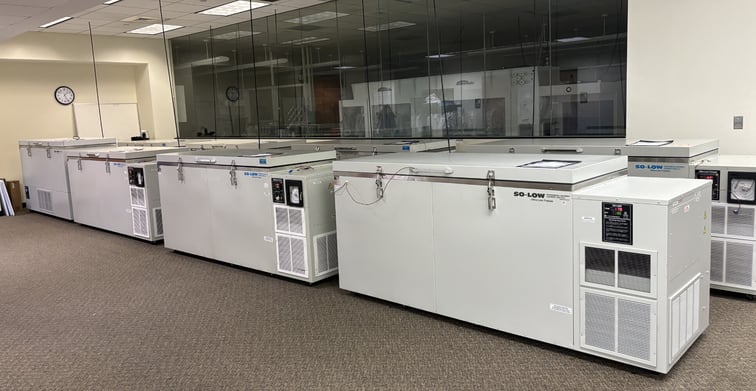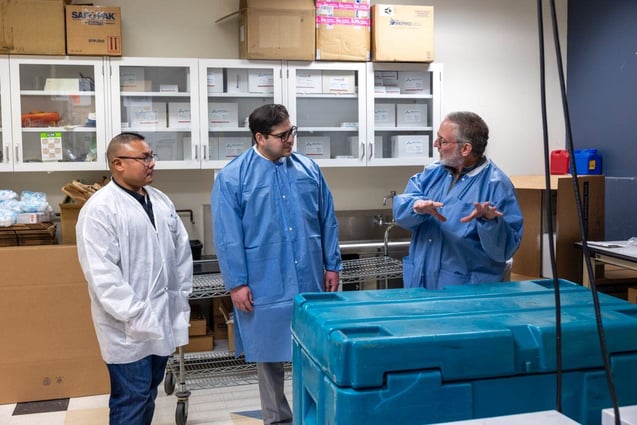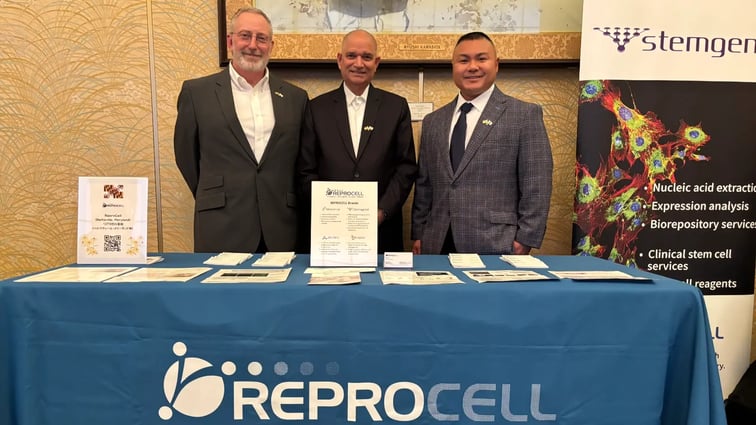The Bioserve Global Biorepository of Human Tissue Samples
Biorepositories (a.k.a. biobanks) contribute to medical and scientific advancements by providing researchers with access to a diverse range of biological materials. These materials are valuable for studying diseases, identifying biomarkers, developing treatments, validating diagnostic methods, and advancing personalized medicine.
The global biorepository at REPROCELL Bioserve has over 600,000 biospecimen consisting of fresh frozen tumor and normal adjacent tissues, whole blood, serum, plasma, DNA, RNA and Formalin Fixed Paraffin Embedded (FFPE) blocks from both tumor and normal tissues and various diseases has helped the researchers in identifying many biomarkers and validating diagnostic methods. Samples in our repository were collected from 120,000 unique donors on four different continents, under a strict Institutional Review Board (IRB). All the donors were consented, and samples can be used for medical research, commercial research, nucleic acid analysis, such as sequencing and expression analysis. All the samples are anonymized with no link to the donor.

Above: ultra low temperature freezers containing part of our biorepository.
The global biorepository at REPROCELL(Bioserve) is one of the largest commercial biorepositories in the world. We have over 600,000 biospecimens collected on four different continents consisting of various nationalities and ethnicities. Each sample has extensive demographic data including three generations of ethnicity and clinical information collected using a Case Report Form (CRF). All the fresh frozen tissues are stored in liquid nitrogen freezers in the vapor phase at −190° C, serum, plasma, and RNA are stored in −80°C freezers, DNAs are stored in −20°C and FFPE block are stored at room temperature. All our freezers and other temperature-controlled units are on back-up power and monitored daily. Following are the disease types and material available in our repository:
|
Study Description |
Tissues |
Blood |
Serum |
Plasma |
DNA |
RNA |
FFPE |
|---|---|---|---|---|---|---|---|
|
Arthritis |
✓ |
|
✓ |
|
✓ |
|
|
|
Asthma |
|
|
✓ |
|
✓ |
|
|
|
Brain Cancer |
✓ |
✓ |
|
|
✓ |
✓ |
✓ |
|
Breast Cancer |
✓ |
✓ |
✓ |
|
✓ |
✓ |
✓ |
|
Breast Cancer (Triple negative) |
✓ |
✓ |
|
|
✓ |
|
✓ |
|
Cardiovascular |
✓ |
|
✓ |
|
✓ |
|
✓ |
|
Cervical Cancer |
✓ |
✓ |
✓ |
|
✓ |
✓ |
✓ |
|
Colon Cancer |
✓ |
|
✓ |
|
✓ |
✓ |
✓ |
|
Comm. Acquired. Pneumonia |
|
|
✓ |
|
✓ |
|
|
|
Deep Vein Thrombosis |
|
✓ |
|
✓ |
✓ |
|
|
|
Dementia |
|
|
|
|
✓ |
|
|
|
Diabetes |
✓ |
|
✓ |
|
✓ |
✓ |
✓ |
|
Early RA |
|
✓ |
✓ |
✓ |
|
|
|
|
End Stage Renal Disease |
|
✓ |
|
✓ |
✓ |
|
|
|
Head and Neck Cancer |
✓ |
✓ |
✓ |
|
✓ |
✓ |
✓ |
|
Hepatic Injury |
|
✓ |
|
✓ |
✓ |
|
|
|
IBD |
|
|
✓ |
|
|
|
|
|
Leukemia |
✓ |
|
✓ |
|
✓ |
|
✓ |
|
Lung Cancer |
✓ |
✓ |
✓ |
✓ |
✓ |
✓ |
✓ |
|
Lupus |
✓ |
✓ |
|
✓ |
✓ |
|
|
|
Lymphoma |
✓ |
✓ |
✓ |
|
✓ |
✓ |
✓ |
|
Multiple Myeloma |
|
✓ |
✓ |
|
|
|
|
|
Multiple Sclerosis |
|
✓ |
✓ |
✓ |
✓ |
|
|
|
Osteoporosis |
|
|
✓ |
|
✓ |
|
|
|
Other GI cancer |
✓ |
✓ |
✓ |
|
✓ |
✓ |
✓ |
|
Ovarian Cancer |
✓ |
✓ |
✓ |
|
✓ |
✓ |
✓ |
|
Prostate cancer |
✓ |
✓ |
✓ |
✓ |
✓ |
✓ |
✓ |
|
Psoriasis |
|
✓ |
✓ |
✓ |
✓ |
|
|
|
Renal Cancer |
✓ |
|
✓ |
|
|
✓ |
✓ |
|
Rheumatoid Arthritis |
|
|
✓ |
|
✓ |
|
|
✓ indicates the samples we have in our inventory.
Downloads
Controls: REPROCELL (Bioserve) has a collection of healthy control samples that can be matched for age, gender, ethnicity, smoking status, body mass index, etc., as required by the study. This provides researchers to conduct case control studies. The control population in our collection has the same data that provides detailed demographic data as our diseased collections. Our information technology (IT) professionals can provide matched control samples based on researchers’ request.
|
Study Description |
Tissues |
Blood |
Serum |
Plasma |
DNA |
RNA |
FFPE |
|
Controls |
✓ |
✓ |
✓ |
✓ |
✓ |
|
✓ |

Human Tissues: All the tissues were collected twenty minutes after the arterial ligation and flash frozen immediately. Two pathologists have verified the diagnosis and the H&E-stained slides are available for verification. All the tissues are stored frozen in the liquid nitrogen vapor phase. These tissues have never been thawed. RNA extracted from these tissues consistently has an RNA integrity number (RIN) value of over 7.0.
Above: H & E-Stained Synovium Tissue

Above: H & E-Stained IBD Tissue
Human Whole Blood: Whole blood was collected usually before or right after the surgery, one tube was frozen, and the other was processed for serum/plasma. REPROCELL (Bioserve) has frozen whole blood collected in EDTA tubes and/or PAX gene tubes.
Human Serum and Plasma: Blood collected from the subjects, usually before or right after the surgery, are processed for serum and plasma within two to 24 hours. These blood fractions are stored in 1ml aliquots in −80°C freezers and are never thawed. Freezers are monitored every day and are under back-up power.
FFPE Blocks: At the time of the surgery two FFPE blocks for each tissue are made and one block is used for the pathology and the second block is stored for future development of diagnostic methods or clinical validation of diagnostic methods. All the pathology reports associated with the blocks are available. REPROCELL (Bioserve) has over 15,000 blocks, both diseased and adjacent normal, that have been used by many pharmaceutical and biotech companies to identify biomarkers, validate clinical diagnostic methods, and develop diagnostic methodologies. These blocks are stored at room temperature.


Human RNA and DNA: REPROCELL (Bioserve) has DNA/RNA samples from various diseases such as various cancer types such as breast, lung, colon, and prostate. In addition, various metabolic diseases such as cardiovascular, arthritis and diabetes. DNAs are also available from over 10,000 healthy normal controls for conducting matched case control studies. All the DNAs are stored in frost free −20°C freezers and RNAs are stored in −80°C freezers.

Each human tissue sample is accompanied with:
- Detailed demographic information, including family history for three generations
- Gold standard clinical diagnostic information
- Complete drug history, including adverse events
- Full pathology report, including H and E slides
- Complete phenotypic data






